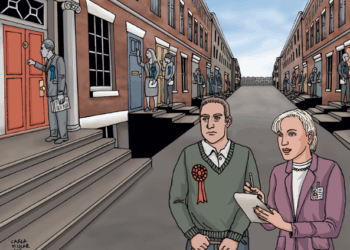Cllr David Rogers is the Deputy Leader of the Conservative Group on Cherwell District Council.
It’s an interesting time to be in Local Government and momentum is swinging back our way. The best speech from a Conservative leader in many years was delivered at the Party Conference, where Kemi expressed the importance of Conservative values and showed us a way forward. The recent Local Government Association Conference in Liverpool was also positive for Conservatives, and I take my hat off to Kevin Bentley and the team for a job well done.
Locally, we’ve welcomed Councillor Dr Chukwudi Okeke, who crossed the floor from Labour to join the Conservative ranks. As a group, we continue to work hard for the people we represent and look forward to next May’s local elections with a sense of anticipation.
Local Government faces many challenges, but two in particular are consuming time, effort, and money, distracting from the services our residents expect.
The first is Local Government reform, which has been raised and shelved repeatedly. The sheer effort poured into a process that will likely cost more than it saves frustrates both officers and members. Government is only now realising that to maintain a link between councils and the electorate, we will still need local committees and staff to deliver services.
Small unitary authorities risk duplicating costly structures to manage Adult and Children’s Social Care, by far the largest county council budget. Large unitary areas, however, risk disconnecting councils from the people, potentially thrusting Town and Parish councils into the front line of service delivery. I respect the crucial role of our grassroots colleagues, who are usually non-political, locally focused, and often unrewarded. If they are forced into this position, they deserve proper support.
There is logic in a single council offering residents a one-stop shop, bringing Planning and Highways together. Planning committees often complain about highways decisions, but such issues could be solved through better training and grown-up conversations where local Councillors can express their local knowledge.
In Oxfordshire, we face a unique situation: five district councils, a county council, and three competing unitary proposals. The Lib Dem county council favours a single unitary, while Lib Dem district councils prefer multiple unitaries. Both arguments have merit, and I welcome the chance to debate the future, though ultimately Labour’s Secretary of State will decide.
The second major challenge is the upcoming reset of business rates, a pivotal moment for local government finance. For district councils that have driven growth and used business rates to keep council tax low, the reset poses risks. Business rates, a key funding source since the retention scheme’s introduction, have underpinned financial stability for pro-growth councils. But the reset, which redistributes growth achieved since the last baseline, threatens authorities like Cherwell and West Oxfordshire which have spent decades promoting business development. We could now be among the hardest hit.
For districts with limited tax bases, the reset will “wipe the slate clean,” returning accumulated growth to the central pot for redistribution. Labour will claim this strengthens fairness by diverting funds to areas of greater need, but it undermines councils that have worked tirelessly to attract investment and regenerate towns. Conservative-run authorities are being punished for doing the right thing. Councils that pursued bold, place-shaping agendas may feel cheated when they see little reward for their efforts.
We’re also losing the final remnants of the New Homes Bonus—yet another cut to our budget, more savings to find, and greater pressure on discretionary services.
Development continues, but villages are paying the price. Any community without an up-to-date Neighbourhood Plan allocating sites is exposed to speculative development. Planning authorities, constrained by NPPF targets and the “tilted balance” favouring housing approvals, are effectively held hostage. This government has stacked the cards against planning committees nationwide.
As a rural area, we’ve also felt the impact of the proposed Inheritance Tax change on family farmers. I’ve attended many Farmers’ Protests to show my support. I hope the Treasury reconsiders this damaging tax mistake. Reversing it would hugely benefit family farmers and family run businesses across the country. If Labour does not reverse it we will when we return to power.
Despite the challenges, I remain optimistic. With strong Conservative values, the energy of our councillors, and a commitment to standing up for our communities, I believe Conservative run councils are the best bet to deliver for residents and shape a positive future for Local Government.









![Donald Trump Slams Chicago Leaders After Train Attack Leaves Woman Critically Burned [WATCH]](https://www.right2024.com/wp-content/uploads/2025/11/Trump-Torches-Powell-at-Investment-Forum-Presses-Scott-Bessent-to-350x250.jpg)







